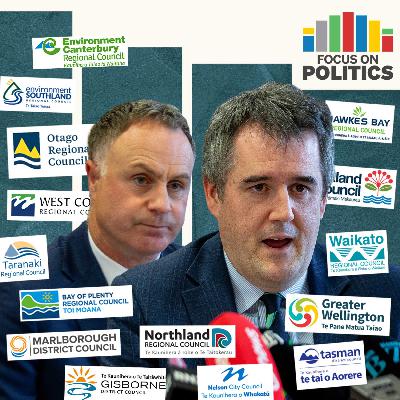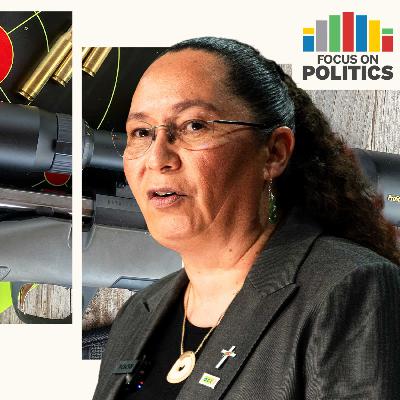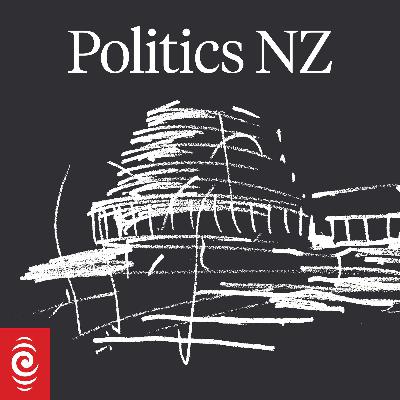Discover Focus on Politics
Focus on Politics

237 Episodes
Reverse
The leaders of ACT, New Zealand First, Te Pāti Māori, and the Green Party sit down with RNZ's press gallery team to share their thoughts on 2025, and what they've got up their sleeves for election year.Go to this episode on rnz.co.nz for more details
RNZ's political team sits down with the leaders of the two major parties - National's Christopher Luxon and Labour's Chris Hipkins - to reflect on 2025 and look forward to election year. Go to this episode on rnz.co.nz for more details
The government is telling councils to 'live within their means' and is introducing a rates cap. It's popular with ratepayers who have seen their bills skyrocket, but councils are warning it'll come at a cost of services. Coming hot on the heels of the government's move to abolish regional councils, political reporter Giles Dexter examines what councils and ratepayers may have to learn to live with.Go to this episode on rnz.co.nz for more details
Just six weeks after voters elected new regional councillors, their jobs now hang in the balance after a government proposal to abolish them. But do the promises of simplicity and savings hold up, and where does all this lead in the long term? In Focus on Politics, Russell Palmer examines the government's shakeup of councils and the tension points for the government.
Go to this episode on rnz.co.nz for more details
The Arms Act has been home to New Zealand's gun laws since 1983, though it's had many, many iterations. The coalition has now overhauled the legislation - but it's not exactly the shake-up many were expecting. Political reporter Anneke Smith takes a closer look at the changes and explains why the ACT Party didn't get everything it wanted.
Go to this episode on rnz.co.nz for more details
The IPCA's blistering report has torn open a years-long saga of misconduct and misplaced loyalty. In Focus on Politics, RNZ acting political editor Craig McCulloch lays out how the scandal unfolded.Go to this episode on rnz.co.nz for more details
If you follow New Zealand politics, you'll want to follow Politics NZ. Get Nine to Noon Politics, The Whip, Morning Report's politicians panel, Focus on Politics, The House, and Context all in one feed.Go to this episode on rnz.co.nz for more details
Te Pāti Māori’s internal conflict has exploded into full public view. RNZ acting political editor Craig McCulloch unpacks how the turmoil unfolded - and whether there's any way back from the brink.Go to this episode on rnz.co.nz for more details
RNZ acting political editor Craig McCulloch takes a look at Labour's long-awaited tax plan and the old ghosts now stirring.Go to this episode on rnz.co.nz for more details
The largest strike in decades swept the country this week - or at least tried to, as wild winds blew away rallies.
Behind the picket lines, the government and unions traded accusations of bad faith and misrepresentation.
In this week's Focus on Politics, RNZ's acting political editor Craig McCulloch unpacks the high-stakes fight for public sympathy.Go to this episode on rnz.co.nz for more details
Political reporter Anneke Smith looks into the government's plans to soften its targets for methane emissions - and what the farming and scientific communities think it means for the country, and the planet.Go to this episode on rnz.co.nz for more details
Te Pāti Māori has regrouped after the death of an MP, a confronting outburst about multiculturalism and a key ally - Toitū Te Tiriti - severing allegiance. It held a 'reset' at Parliament this week, though it ended in the party's co-leaders storming off when asked about allegations of dictatorial leadership. Our political reporter Lillian Hanly explains why and what the party was trying to achieve this week.
Go to this episode on rnz.co.nz for more details
In Focus on Politics this week, the government's struggle to convince with its big energy announcement augurs a stormy election season ahead. With National's coalition partners amping up for the election, political reporter Russell Palmer untangles an issue that promises to electrify the electorate. Go to this episode on rnz.co.nz for more details
A new Reserve Bank governor has been appointed, and Dr Anna Breman is well aware her first task will be to rebuild transparency and accountability at the central bank. In this week's Focus on Politics, political reporter Giles Dexter looks at the Reserve Bank's tumultuous year, and what fresh challenges await the incoming governor.Go to this episode on rnz.co.nz for more details
The latest RNZ-Reid Research poll showed a deadlocked Parliament and some uninspiring results for Christopher Luxon and Chris Hipkins. The public is increasingly pessimistic over the way the country's going, and more are blaming the current government for New Zealand's economic struggles. In this week's Focus on Politics, political reporter Giles Dexter digs into the poll results, and what the latest GDP figures mean for the government's growth agenda.Go to this episode on rnz.co.nz for more details
There were plenty of political attacks flying around New Zealand First's annual general meeting last weekend and it's government partners weren't spared from some friendly fire. Roughly one year out from the election, government parties are making a real effort to differentiate themselves for votes. RNZ political reporter Russell Palmer examines how this is going and what impact it might have on coalition relationships.
Go to this episode on rnz.co.nz for more details
The door to foreign home ownership was slammed shut by the Labour-New Zealand First coalition in 2018. Now, a slight tweak cracks it open for wealthy investors to buy - or build - one luxury home. What's the case for this carve out in the foreign buyers ban? Why do we have a ban in the first place? And why does Winston Peters' name keep coming up?
Go to this episode on rnz.co.nz for more details
Labour's Peeni Henare and Te Pāti Māori's Oriini Kaipara are vying for the Māori seat made vacant by the shock passing of Takutai Tarsh Kemp. The contest is shaping up as one of a proven track record versus a refreshed movement, a former Labour Minister versus a first time candidate backed by a resurgent Te Pāti Māori. Political Reporter Lillian Hanly travels to Tāmaki Makaurau to meet the front-runners hoping to lead the electorate into the next election.
Go to this episode on rnz.co.nz for more details
The coalition is under pressure from the cost-of-living crisis, with job losses, soaring food prices and a construction slowdown hitting hard. This week brought some policy changes and a Reserve Bank rate cut. On Focus on Politics, RNZ acting political editor Craig McCulloch looks at whether that relief will be enough to break the government’s winter of discontent. Go to this episode on rnz.co.nz for more details
With political polls predicting a knife-edge election, what is the opposition promising, how could all three parties work together, and who's really in charge on that side of the house? In Focus on Politics, political reporter Anneke Smith takes a look at the state of the opposition one year out from the 2026 Election. Go to this episode on rnz.co.nz for more details


















